The Fastest Animals
Which are the fastest air, land and water animals?
Here is a list of the 20 fastest animals in the world. We also have exciting facts for you - for example, how to measure their speed and why animals don't always move at maximum speed.
Would you have thought that a peregrine falcon doing a nosedive is almost as fast as a Formula 1 racing car? And that a cheetah, the fastest land animal, would probably be too fast for an ordinary speedometer?
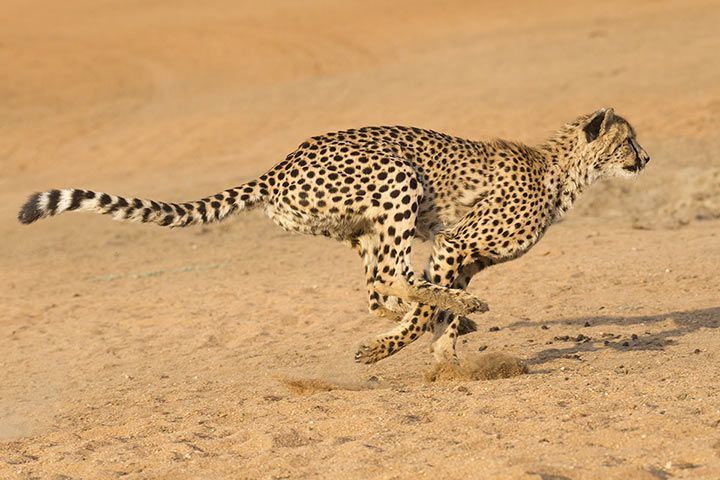
The Fastest Animals by Type of Locomotion
Let's start with the top 3 flyers, runners and swimmers:
| Category | Animal | Speed |
|---|---|---|
| Fastest animal in the air | Peregrine falcon | 200 mph (322 km/h) |
| Fastest animal on land | Cheetah | 56-74.5 mph (90-120 km/h) |
| Fastest animal in the water | Sailfish | 46-68 mph (75-110 km/h) |
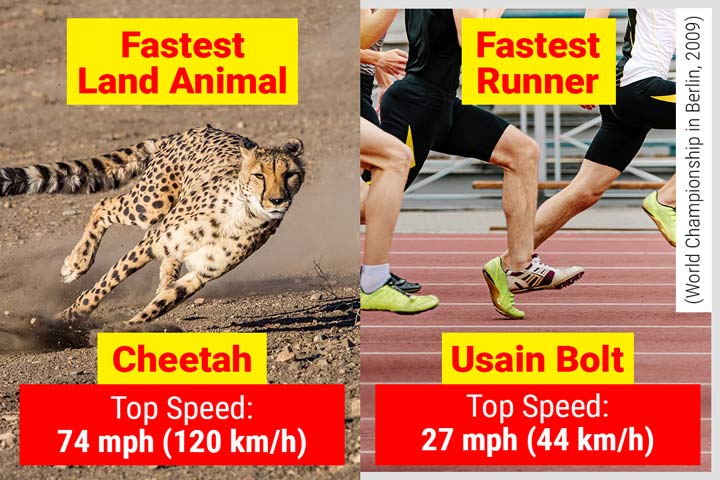
Top 20 Fastest Animals in the World
| Category | Animal | Speed |
|---|---|---|
| Fastest bird (nose dive) | Peregrine falcon | 200 mph (322 km/h) |
| Fastest mammal (flying) | Mexican free-tailed bat | 100 mph (160 km/h) |
| Fastest bird (flying) | Grey-headed albatross | 79 mph (127 km/h) |
| Fastest terrestrial animal (short distance) | Cheetah | 56-74.5 mph (90-120 km/h) |
| Fastest fish | Sailfish | 46-68 mph (75-110 km/h) |
| Fastest terrestrial animal (long distance) | Mexican pronghorn | 55 mph (88 km/h) |
| Fastest bird (running) | Ostrich | 43 mph (70 km/h) |
| Fastest dog | Greyhound | 43 mph (70 km/h) |
| Fastest rabbit | Brown hare | 43 mph (70 km/h) |
| Fastest marine mammal | Orca | 40 mph (65 km/h) |
| Fastest marsupial | Kangaroo | 34 mph (55 km/h) |
| Fastest insect (flying) | Hawker dragonfly A. costalis | 31 mph (50 km/h) |
| Fastest seal | Californian seal | 25 mph (40 km/h) |
| Fastest bird (in the water) | Gentoo penguin | 22 mph (36 km/h) |
| Fastest reptile (in the water) | Leatherback turtle | 22 mph (35 km/h) |
| Fastest reptile (running) | Spinytail iguana | 22 mph (35 km/h) |
| Fastest insect (running) | Tiger beetle | 5.5 mph (9 km/h) |
| Fastest millipede | House Centipede | 1 ft/sec. (0.4 m/sec.) |
| Fastest starfish | Common sunstar | 9.8 ft/min. (3 m/min.) |
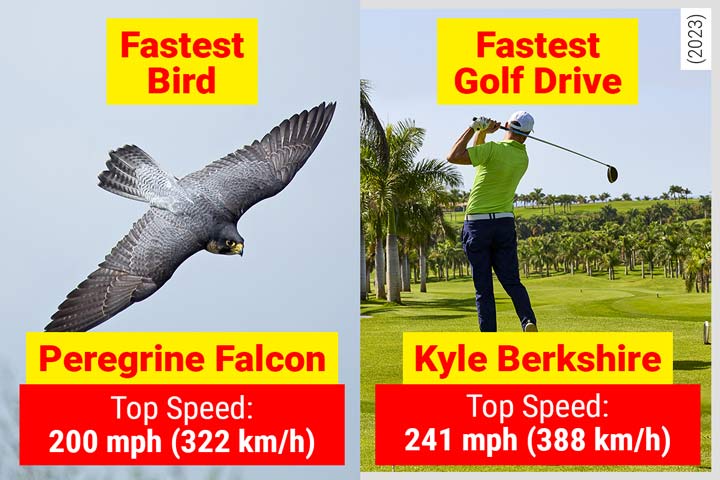
Average and Maximum Speed
While hunting or on the run, animals need to move very fast for a short while. If you are late for the bus or for your first lesson at school you also tend to run much faster than usual. Yet, you cannot keep up this speed all day. This would be much too exhausting. The same with animals. The speeds listed here therefore apply for short distances only - when an animal is on the run or hunting.
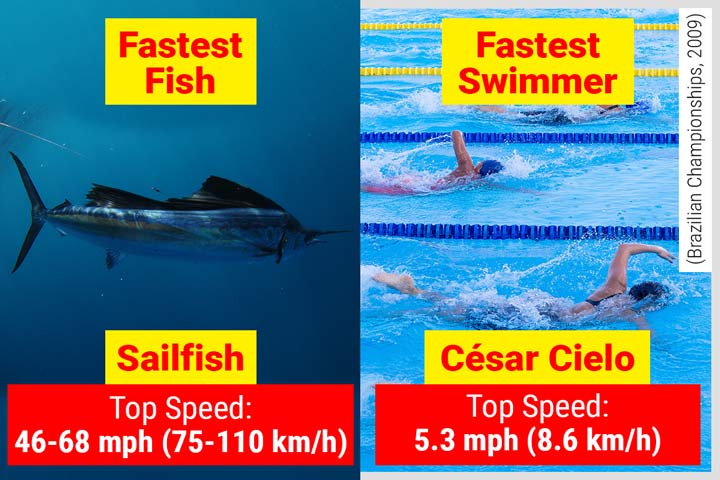
How to Measure Speed
Cameras, Stopwatches and Collars
To find out how fast an animal is, cameras commonly used in traffic to catch speeding drivers are used to determine the speed of animals. Sometimes stopwatches or collars with speedometers are used as well. Scientists sometimes even follow the animals in cars and read the speed from the speedometer.
How Accurate Are Speed Measurements?
What do all of these techniques have in common? Speed can't be measured with absolute accuracy. That's why there are always different statements and everyone claims to be right. This often leads to arguments among scientists. animalfunfacts.net decided to indicate speeds with “from to”. For instance 56-74 mph (90-120 km/h).
Example: Cheetah
• Using the Car
It wouldn't make much sense to follow a cheetah with a car to measure its speed. A cheetah changes its direction often while running. It is a wild animal and can't be trained to run along a long, straight path.
• Using a Collar With Speedometer
In order to measure its speed, scientists put a collar with an integrated speedometer on it and wait until it goes hunting for prey. But that doesn't mean that the cheetah is running as fast as POSSIBLE. To save energy, it runs as fast as NECESSARY. The distance is only 1,312-1,640 feet (400-500 meters).
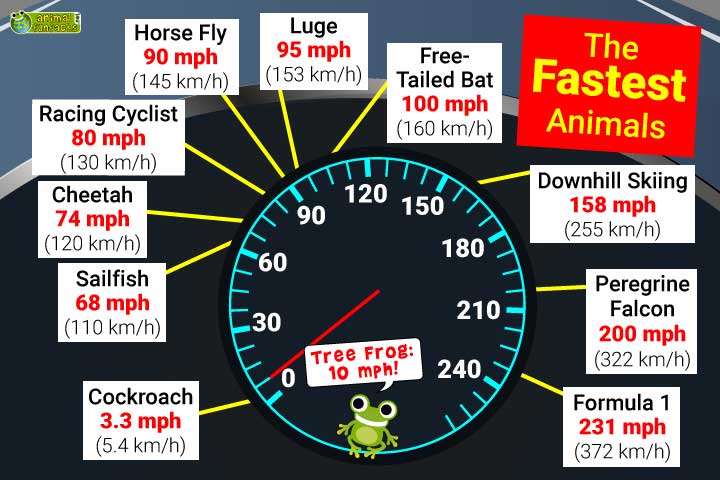
Fun Facts
Cockroaches Are Faster than Expected
Yet, the “slow” animals among the fastest are stunning as well: A cockroach can easily keep up with a briskly walking human. The tiger beetle is even faster. And if you are not fast enough on your bicycle, you could be overtaken by a leguan.
More articles about fast animals: Here you can find everything about the fastest land animals, the fastest birds in the world and the fastest fish.
